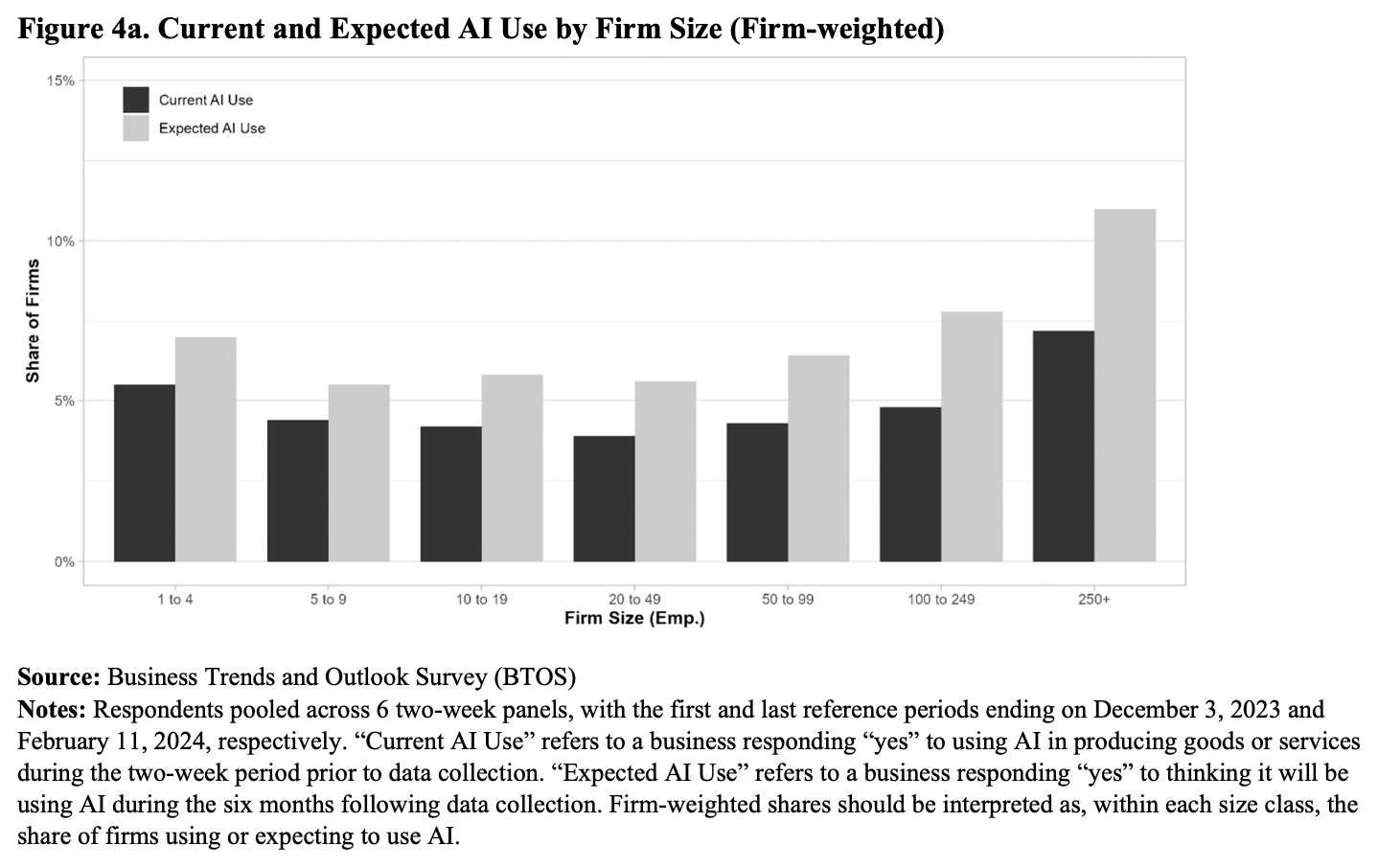According to a recent business survey by the US Census Bureau, only about 1 in 20 businesses are currently using AI (though growing fast), with 80.9% citing the inapplicability of AI to their business as the most common reason for not implementing AI into their business.
Notably, there is a U-shape of adoption - with large enterprises with over 250 employees and very small startups with less than 4 employees the most likely to use AI (see figure below).

It makes sense that Small to Mid-size Businesses (SMBs) would be on the lower end of the adoption curve. Unlike very small startups, they have years or even decades of legacy infrastructure that makes it hard for them to natively integrate AI into their products and processes. And unlike large enterprises, they often aren’t large enough to hire their own data scientists and machine learning engineers to build in-house solutions.
As a result, while they are generating more data than ever from their supply chain, their point of sales, and their customer service touchpoints, they are unable to unlock the full value of this data because AI is too difficult to actually implement given their current capabilities.
The good news is AWS has built a full Generative AI stack that meets each company where they are. For fully staffed data science teams, they provide all the foundational compute, framework support, or tools for training your own models or testing different LLMs for your use cases. But for less advanced enterprises, AWS provides very powerful yet simple APIs like Amazon Bedrock or Amazon Q to insert Generative AI capabilities into your existing stack without having to develop them on your own.
Sounds promising, right? But the truth is even the simplest API is never truly plug and play. At Metal Toad, we start each engagement with SMBs with a free strategy session where we guide a conversation with the organization’s leadership to figure out where the data-volume-to-insights bottlenecks are occurring, and where Generative AI can help. From there, our team of experts can quickly spin up a proof of concept (PoC) to provide business value AND technical validation.
The truth is no technology is a magic bullet, but if upfront we understand the business value we are looking to achieve, then we can develop a PoC to bring stakeholders to the right confidence level and make an informed decision about the investments in AI.
For example, we recently worked with GeniusVets, a digital platform connecting pet owners with personalized needs with local pet experts best suited for those needs. GeniusVets was looking to improve call center training by finding the most problematic customer calls and figuring out what was causing customer dissatisfaction. However, to do this the team would need to sift through hundreds of recorded calls every day to find the most problematic ones.
They had tried traditional machine learning approaches but that soon hit a limit since traditional ML requires vast amounts of highly tagged and curated training data. To do this with GeniusVets was going to be prohibitively expensive.
Working with Metal Toad, however, we were able to use Amazon Bedrock to quickly scan the call transcripts and immediately categorize calls so business users could find, for example, which calls failed to lead to a scheduled followup. The PoC was able to deliver these insights at a high enough accuracy and speed that it unlocked the full value of their call center data in a way that was not possible before.
With the AWS Generative AI stack, the hard part is not the AI as much as it is building and maintaining the data pipelines that feed data from source to inference, and then from the inference to the output where downstream business users can actually use it. And this is why SMBs like GeniusVets are turning to us. We have become their specialized SWAT team for not just Generative AI, but also application modernization and infrastructure cost-to-performance optimization across the board.
If you’re interested in a free GenAI PoC, reach out to us.